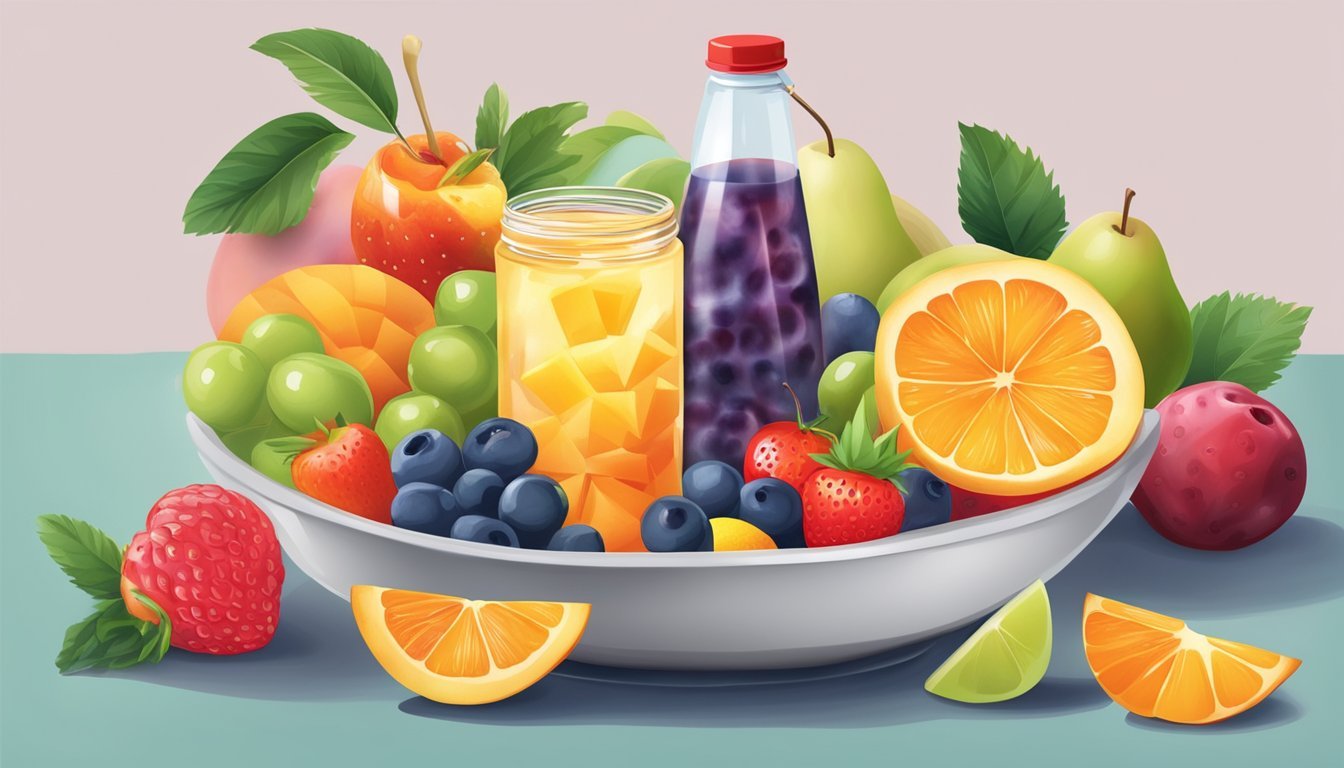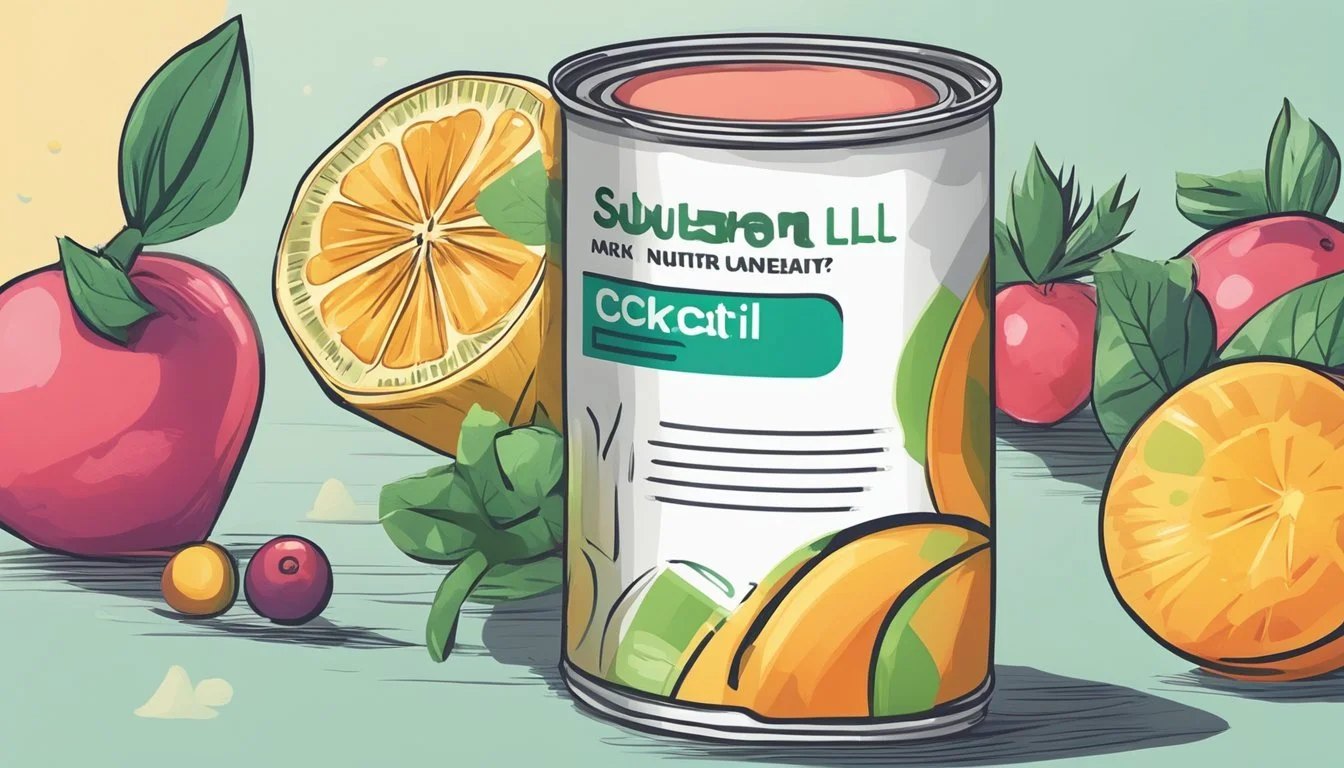Can Diabetics Eat Canned Fruit Cocktail in Syrup?
What You Need to Know
Managing diabetes involves careful consideration of dietary choices, especially when it comes to fruit. Fresh fruit is typically the better option; however, canned fruit can also be included in a diabetes-friendly diet. Canned fruit cocktail in syrup is not ideal for diabetics due to the high levels of added sugars that can significantly raise blood glucose levels.
Choosing the right type of canned fruit is crucial. Opting for canned fruits packed in their own juice or water is a healthier option. These alternatives do not contain added sugars and still offer essential nutrients that are beneficial for health.
Furthermore, canned fruits provide an affordable and convenient source of nutrition year-round. They have a long shelf life and can help reduce food waste, making them a practical choice for those managing diabetes.
Understanding Diabetes and Diet
Managing diabetes involves careful consideration of diet, especially regarding carbohydrate intake and the types of sugars consumed. This section addresses how sugar impacts blood sugar levels, the importance of carbohydrate counting, the role of diet in managing diabetes, benefits of whole fruits, and the risks associated with processed fruit.
Impact of Sugar on Blood Sugar Levels
Sugars directly affect blood glucose levels, making it crucial for individuals with diabetes to monitor their intake. When sugary foods are consumed, they are quickly absorbed into the bloodstream, causing a rapid spike in blood sugar levels. This spike can be dangerous, particularly for those requiring strict blood sugar management. Consuming foods with high glycemic indexes, such as canned fruit in heavy syrup, can exacerbate blood sugar fluctuations and thus should be minimized or avoided.
Importance of Carbohydrate Counting in Meal Plan
Carbohydrate counting is vital for managing diabetes effectively. Each gram of carbohydrate can influence blood glucose levels, making portion control and precise measurement essential. By keeping track of the carbs consumed, individuals can better predict their blood sugar responses and adjust their insulin doses accordingly. Tools like food labels and apps help count carbs in fresh and processed foods, ensuring balanced and nutritious meal plans that maintain stable blood glucose levels.
Role of Diet in Managing Diabetes
A well-planned diet plays a fundamental role in diabetes management. It helps maintain healthy blood glucose levels, supports weight management, and reduces the risk of diabetes-related complications. Diets rich in whole grains, lean proteins, healthy fats, and low in refined sugars and high-GI fruits are recommended. Small, frequent meals and snacks inclusive of balanced macronutrients help in steady glucose monitoring and overall health improvement.
Benefits of Whole Fruits in a Diabetes-Friendly Diet
Whole fruits are a nutritious component of a diabetes-friendly diet. They provide essential vitamins, minerals, fiber, and antioxidants without the added sugars found in processed fruit products. Fresh fruit, in particular, offers a low glycemic index option, promoting gradual nutrient release and steady blood sugar levels. Proper portion sizes, such as a small apple or a cup of berries, ensure nutritional benefits without sugar overload.
Risks Associated with Processed Fruit
Processed fruits, particularly those canned in syrup, pose significant risks for individuals with diabetes. Heavy syrup packs these fruits with added sugars that can quickly raise blood glucose levels. Even lighter syrups or natural juices can contribute unnecessary sugars if consumed in excess. These products often lack the fiber found in fresh fruit, making blood sugar spikes more likely. To minimize risks, it's advisable to choose whole fruits or those canned without added sugars.
Can Diabetics Eat Canned Fruit Cocktail in Syrup?
People with diabetes often need to monitor their carbohydrate and sugar intake closely. Canned fruit cocktails in syrup can potentially affect blood sugar levels and should be considered carefully in a diabetes diet.
Nutritional Profile of Canned Fruit Cocktail
Canned fruit cocktails typically consist of a blend of various fruits, such as peaches, pears, grapes, and cherries, usually preserved in syrup. Heavy syrup contains a higher concentration of added sugars compared to light syrup or those canned in their own juice. The added sugars can significantly increase the total carbohydrate content, contributing to higher blood sugar levels. However, these fruit cocktails still retain essential nutrients like vitamins and minerals, though the quantity may be lower than in fresh or frozen fruits.
Comparison with Fresh, Frozen, and Dried Fruit
Fresh, frozen, and dried fruits differ considerably in nutrient retention and sugar content. Fresh fruit usually has the best nutrient profile, with the least processing and no added sugars. Frozen fruit retains most of the nutrients present in fresh fruit and stays free from added sugars if no additional ingredients are included. Dried fruit can have added sugars for preservation and often has a higher carbohydrate content per serving due to the removal of water, concentrating the natural sugars. Canned fruit in heavy syrup should be considered less ideal due to the high sugar content compared to its fresh and frozen counterparts.
Understanding Serving Sizes and Moderation
Serving sizes are critical when incorporating any fruit, including canned fruit cocktails, into a diabetic diet. A standard serving size might be around ½ cup of drained fruit. It is crucial to drain and rinse fruits canned in syrup to remove excess sugars. Practicing moderation helps manage blood sugar levels effectively. For example, a small portion of canned fruit without syrup can be paired with a protein or fiber-rich food to mitigate potential blood sugar spikes.
Assessing Glycemic Index of Canned Fruit Cocktails
The glycemic index (GI) measures how quickly carbohydrates in a food raise blood sugar levels. Typically, fruits have varying GI values. When fruits are canned in heavy syrup, their GI increases due to the added sugars, leading to faster and higher blood sugar spikes. Conversely, fruits canned in natural juices or water have a lower GI. Understanding the GI of these fruit cocktails can help diabetics make informed choices, opting for low-GI varieties and combining them with low-GI foods to maintain stable blood sugar levels.
Healthier Alternatives to Canned Fruit in Syrup
Diabetics should aim for fruits with natural sugars and minimal added sugars. Here are some ways to include fruit in your diet while managing blood sugar levels effectively.
Choosing Fruits with No Added Sugars
Opt for fruits canned in water or their own juice. These options have fewer added sugars which can help maintain better glucose control. Labels should be checked for phrases indicating no added sugars. Unsweetened applesauce or other similar options can be beneficial.
Examples: Peaches, pears, and apples canned in their own juice.
Incorporating Fresh, Frozen, and Dried Fruits
Using fresh, frozen, or dried fruits can provide important nutrients without the high sugar content found in syrup-packed fruits. Fresh and frozen fruits retain their nutritional value well. When choosing dried fruits, ensure there are no added sugars.
Examples of suitable fruits: Berries, apples, peaches, and pears.
Creating Balanced Snacks with Fruits
Pair fruits with proteins or healthy fats to create a balanced snack that can help stabilize blood sugar levels. Combinations like fruit and nuts, yogurt, or incorporating fruits in smoothies can provide sustained energy.
Balanced snack ideas:
Sliced apples with peanut butter
Berries with Greek yogurt
Fruit and nuts trail mix
Diabetes-Friendly Sweetening Options
For those with a sweet tooth, there are options to use natural sweeteners judiciously. Stevia, monk fruit sweetener, or a small amount of honey can be incorporated into fruits to add sweetness without spiking blood sugar.
Consider using:
Stevia for a no-calorie option
Very small amounts of honey or maple syrup in moderation
Recommended Fruit Servings for Diabetics
Moderation and proper serving sizes play a critical role in managing diabetes. Dietitians often recommend keeping a consistent daily intake of fruit servings. Typically, a single serving is about one small piece of fruit or half a cup of fresh fruit. Maintaining a consistent, balanced diet with controlled carbohydrate intake is essential.
Daily servings: 1-2 servings of fruit per day, adjusted by a healthcare provider based on individual dietary needs.
Following these guidelines can help diabetics include beneficial fruits in their diet without adversely affecting blood sugar levels.
Tips for Including Fruit in Diabetes Meal Plans
Diabetics can benefit from including fruit in their diets by focusing on portion control, frequency, and variety to manage blood sugar levels while obtaining essential nutrients like fiber and vitamins.
Designing a Balanced Diabetes Meal Plan
When creating a meal plan for diabetics, it's important to integrate a balance of carbohydrates, protein, and fats. Fruits, though containing natural sugars, provide valuable vitamins, minerals, and fiber. Including fruits alongside lean proteins and healthy fats can help stabilize blood sugar.
A meal plan should include non-starchy vegetables such as greens, peppers, and tomatoes. Aim for half of the plate to be covered with these vegetables. One quarter should consist of lean protein like chicken or fish, and the remaining quarter can include whole grains and fruits.
Understanding Portion Sizes and Frequency
Correct portion sizes are crucial to managing carbohydrate intake. For fruit, a standard portion is:
½ cup of frozen or canned fruit (without added sugar)
⅓ to ½ cup of fruit juice
2 tablespoons of dried fruit (e.g., raisins, cherries)
Diabetics should aim to spread fruit intake throughout the day, ideally in smaller portions. This helps to avoid spikes in blood sugar levels. Measuring or using a food scale can be helpful to maintain accurate portion sizes.
Incorporating a Variety of Fruits and Vegetables
Diversity in diet ensures a range of nutrients. For diabetics, including a variety of fruits like berries (strawberries, blueberries), citrus fruits (oranges, grapefruits), and apples can ensure they receive a broad spectrum of vitamins and minerals.
Vegetables are equally important. Incorporate a mix of leafy greens, carrots, and bell peppers. Ensuring the inclusion of both fruits and vegetables not only provides necessary fiber, which aids in managing blood sugar but also delivers antioxidants that benefit overall health.
Economic Considerations and Fruit Selection
Making informed decisions about fruit options can significantly impact dietary costs and nutritional benefits, especially for those managing diabetes. This section explores the financial aspects and practical tips for choosing between canned, fresh, and frozen fruits.
Cost-Effectiveness of Different Fruit Options
Canned fruit often presents a cost-effective option, especially when packed in water or natural juice. Avoiding those in heavy syrup is crucial for diabetics. Fresh fruit is ideal but can be costly and less available outside of peak seasons. Frozen fruit offers a middle ground, maintaining nutrients and often being more affordable year-round. Comparing prices and nutritional labels can help individuals make the most budget-friendly choices without compromising on health.
Seasonal Buying and Storage Tips
Purchasing fresh fruit during its natural season can lead to better prices and quality. Summer fruits like berries and peaches are cheaper and fresher in summer. Freezing these fruits at their peak can extend their usability. For canned fruit, look for sales and bulk buying options to save money. Proper storage techniques for fresh produce, such as refrigeration and airtight containers, can reduce waste and prolong shelf life.
Potential Health Risks and Benefits
Canned fruit cocktail in syrup poses specific health risks and benefits, particularly for individuals with diabetes. Understanding the impact on chronic diseases and the various health benefits and limitations is crucial.
Link Between Diet and Chronic Diseases
Consuming canned fruit cocktail in syrup can affect one's diet significantly. The added sugars found in the syrup can elevate blood glucose levels, posing a risk for people with diabetes. Elevated blood glucose levels may lead to further complications, such as heart disease, stroke, and potentially an increased risk of cancer.
For individuals striving to manage chronic diseases, focusing on foods without added sugars is beneficial. Opting for canned fruits packed in their own juice or water, instead of syrup, reduces these adverse effects. This dietary modification supports better blood sugar management and lowers the risk of developing related chronic diseases.
Fruit and Overall Health Benefits
Fruits, in general, offer a variety of health benefits due to their high content of vitamins, minerals, and fiber. Canned fruits, if free from added sugars, can also provide these benefits. Essential nutrients like potassium, vitamin C, and fiber are vital for heart health and proper digestion.
For diabetics, including such fruits in their diet helps maintain nutritional balance, enhances immune function, and supports overall well-being. The availability of canned fruits year-round ensures consistent nutrient intake, making them a practical addition to a healthy diet.
Limitations and Caution for Diabetics
While canned fruit cocktail in syrup contains beneficial nutrients, the high sugar content poses significant health risks for diabetics. Consuming these can lead to spikes in blood glucose levels, which can exacerbate diabetes symptoms and contribute to complications such as heart disease and stroke.
To mitigate these risks, diabetics are advised to choose canned fruits packed in water or their own juice. These options have reduced sugar levels and lower impact on blood glucose. Reading labels carefully and monitoring portion sizes are essential practices for diabetics to enjoy the health benefits without the associated risks.






